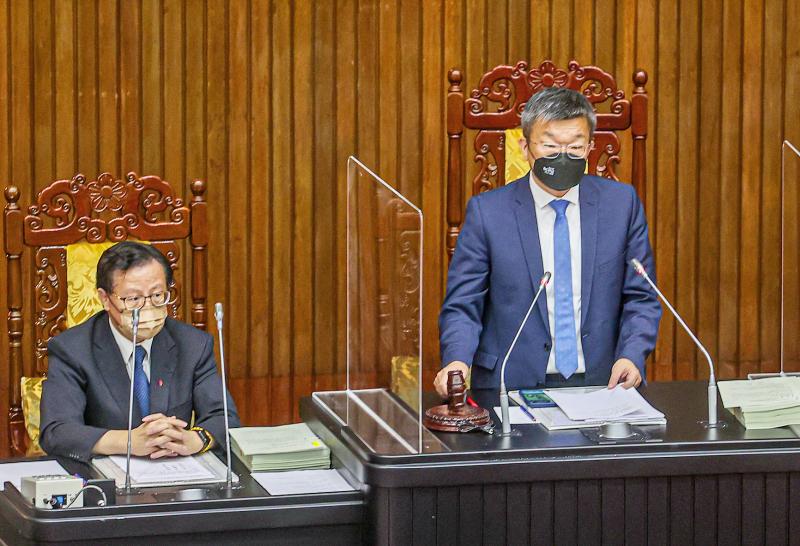The legislature yesterday passed the third reading of an amendment to the Public Functionary Service Act (公務員服務法), which specifies the maximum number of working hours for civil servants and relaxes rules regarding work outside of their government jobs.
The Examination Yuan said it proposed the amendment because the content, strictness and scope of regulations concerning public servants needed updating to meet changes in society.
The proposal was in line with Constitutional Judgement No. 785, which sets the maximum number of working hours and states that a shift system should be established to protect public servants’ health and right to hold public offices.

Photo: CNA
Article 4 of the act prohibits public servants from making statements about their duties or on behalf of their agencies or institutions without the permission of their superiors.
The amendment retains those restrictions, but adds that they are also prohibited from making statements about the services provided by their agencies or institutions.
The amendment also stipulates that public servants must adhere to their designated work schedules, and not arrive late or leave early. Total working hours should be eight hours per day and 40 hours per week, and they should take two days off per week.
Working hours can be adjusted as long as public services are not affected, it says.
The regulation applies to the Presidential Office, the National Security Council, authorities of schools at all levels and the Executive Yuan.
Overtime cannot result in a public servant working more than 12 hours per day, and they cannot work more than 60 hours of overtime per month, it says.
However, while engaging in disaster relief, dealing with urgent or sudden incidents or handling special projects, public servants’ maximum overtime working hours can be set by the Presidential Office, the National Security Council or the five branches of government, it says.
Intervals between each shift should be at least 11 hours, but exceptions can be made for special circumstances, it adds.
Public servants cannot engage in outside work that requires additional certification, but can participate in charitable activities and other nonrecurring, noncontinuous work outside their contracted working time as long as their full-time job is not affected, it says.
It also allows public servants to earn money outside of work using their skills, through sale of property, or through use of their intellectual property or portrait rights.
Civil servants’ pursuits outside of work must not tarnish the reputation of public servants or the government, nor obstruct or conflict with their full-time jobs, it adds.

The High Prosecutors’ Office yesterday withdrew an appeal against the acquittal of a former bank manager 22 years after his death, marking Taiwan’s first instance of prosecutors rendering posthumous justice to a wrongfully convicted defendant. Chu Ching-en (諸慶恩) — formerly a manager at the Taipei branch of BNP Paribas — was in 1999 accused by Weng Mao-chung (翁茂鍾), then-president of Chia Her Industrial Co, of forging a request for a fixed deposit of US$10 million by I-Hwa Industrial Co, a subsidiary of Chia Her, which was used as collateral. Chu was ruled not guilty in the first trial, but was found guilty

‘DENIAL DEFENSE’: The US would increase its military presence with uncrewed ships, and submarines, while boosting defense in the Indo-Pacific, a Pete Hegseth memo said The US is reorienting its military strategy to focus primarily on deterring a potential Chinese invasion of Taiwan, a memo signed by US Secretary of Defense Pete Hegseth showed. The memo also called on Taiwan to increase its defense spending. The document, known as the “Interim National Defense Strategic Guidance,” was distributed this month and detailed the national defense plans of US President Donald Trump’s administration, an article in the Washington Post said on Saturday. It outlines how the US can prepare for a potential war with China and defend itself from threats in the “near abroad,” including Greenland and the Panama

DEADLOCK: As the commission is unable to forum a quorum to review license renewal applications, the channel operators are not at fault and can air past their license date The National Communications Commission (NCC) yesterday said that the Public Television Service (PTS) and 36 other television and radio broadcasters could continue airing, despite the commission’s inability to meet a quorum to review their license renewal applications. The licenses of PTS and the other channels are set to expire between this month and June. The National Communications Commission Organization Act (國家通訊傳播委員會組織法) stipulates that the commission must meet the mandated quorum of four to hold a valid meeting. The seven-member commission currently has only three commissioners. “We have informed the channel operators of the progress we have made in reviewing their license renewal applications, and

A wild live dugong was found in Taiwan for the first time in 88 years, after it was accidentally caught by a fisher’s net on Tuesday in Yilan County’s Fenniaolin (粉鳥林). This is the first sighting of the species in Taiwan since 1937, having already been considered “extinct” in the country and considered as “vulnerable” by the International Union for Conservation of Nature. A fisher surnamed Chen (陳) went to Fenniaolin to collect the fish in his netting, but instead caught a 3m long, 500kg dugong. The fisher released the animal back into the wild, not realizing it was an endangered species at